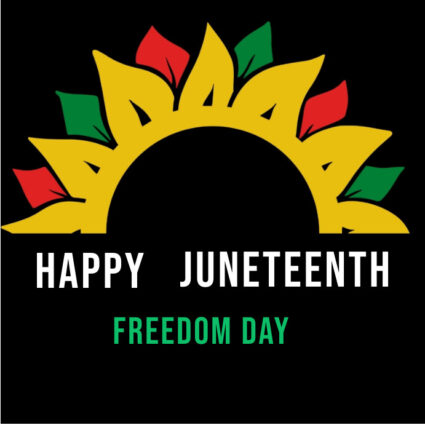(All scriptures in this article are quoted from the New Living Translation of the Holy Bible.)

On June 19, 1865, a pivotal moment in American history occurred when Union soldiers arrived in Galveston, Texas, to announce the Emancipation Proclamation, signed by President Abraham Lincoln two years prior in 1863, which ended slavery in the United States and declared enslaved Black people free. This event is recognized as the genesis of Juneteenth celebrations. The former slaves and the Texas residents began celebrating their freedom by having prayer meetings, singing spirituals, feasting, and dancing. One hundred seventeen years later (1980), Texas finally made Juneteenth a state holiday. Afterward, many other states followed suit by making Juneteenth a state holiday for their citizens, celebrating the day with prayer, religious services, educational events, family gatherings, picnics, music, food, and dancing. Forty-one years later (2021), President Joseph Biden signed a proclamation to make Juneteenth a federal holiday for all states in our nation. As a result, all citizens nationwide can recognize the end of slavery, and Black Americans can celebrate their freedom on the nineteenth of June each year (www.britannica.com/topic/Juneteenth).
Therefore, Juneteenth serves as a potent reminder for America to fully acknowledge the experiences and perspectives of Black Americans in the ongoing pursuit of freedom and equality. This holiday should be a time for our nation to reaffirm its commitment to the promises of liberty and justice for African Americans, principles we pledge allegiance to under our country’s flag. Furthermore, Juneteenth provides an opportunity to emphasize the significance of the 13th Amendment to the United States Constitution for African American citizens, which has two sections: Section 1: Neither slavery nor involuntary servitude, except as punishment for a crime whereof the party shall have been duly convicted, shall exist within the United States, or any place subject to their jurisdiction. Section 2: Congress shall have the power to enforce this article by appropriate legislation.
Section 1 of the 13th Amendment prohibits enslavement from occurring anywhere in America, but subjugation must take place when a person or persons are convicted of committing a crime. This includes the law enforcement officers of our nation incarcerating people for perpetrating unlawful acts, violating court orders given by a judge, or refusing to pay any fines to the government for violating a law or ordinance of a city, state, or federal regulation. Whereas Section 2 clearly states that Congress must impose the first section of the 13th Amendment by creating and passing laws to ensure that slavery is non-existent in the country. While the Emancipation Proclamation and the 13th Amendment were pivotal legal milestones in abolishing slavery, from a spiritual perspective, the grace and love of God in Jesus Christ redeemed the enslaved from the oppression of slavery.
Here are two scriptures from the Bible, where God quotes that He is the One who delivered slaves: “I am the Lord your God who brought you out of the land of Egypt so you would no longer be their slaves. I broke the yoke of slavery from your neck so you can walk with your heads held high (Leviticus 26:13).” “When I have broken their chains of slavery and rescued them from those who enslaved them, then they will know that I am the Lord (Ezekiel 34:27).” Therefore, it can be seen that in the historical moments of President Lincoln signing the Emancipation Proclamation and Congress passing the 13th Amendment, the grace of the Lord our God was at work. It is written in scripture, “On that day the Lord will end the bondage of His people. He will break the yoke of slavery and lift it from their shoulders (Isaiah 10:27).”
Along with His grace, the Lord got help from His Heavenly Hosts, known as His armies in heaven, to free the enslaved. For it is written in scripture, “For on that day, says the Lord of Heaven’s Armies, I will break the yoke from their neck and snap their chains. Foreigners will no longer be their masters (Jeremiah 30:8).” Indeed, the Lord’s grace, compassion, and His armies of heaven have set the enslaved free from the servitude of subjugation. By that, believers recognize the hand of God and His divine power. Therefore, my fellow African American citizens, although we Black Americans living in today’s world have not experienced slavery, we should observe Juneteenth as a privilege to celebrate our freedom from servitude because it is a gift of inheritance given to us by God in Jesus Christ. We can salute the holiday in the Spirit of God by singing negro spirituals, praise dancing, eating soul food, offering prayers of thanksgiving to Christ, or hosting parades, as scripture says, the Lord is the Spirit. Wherever the Spirit of the Lord is, there is freedom (2 Corinthians 3:17).
In conclusion, since God in Christ has truly set us free, we must now be sure to commemorate Juneteenth to stay free and not get tied up again to slavery to the law (Galatians 5:1)—the bondage of unjust incarceration. Instead, let us mark the holiday by maintaining and enjoying our liberation from imprisonment for committing a crime or any other infringement. Therefore, as we African Americans (and all other American citizens) celebrate the blessings of freedom this Juneteenth, let us all strive to resolve our obligations to one another and our community. By clearing ourselves from debts such as recompense for property damage or injury and payment of fines, we can prevent the bondage of lawsuits, court orders, and possible incarceration, ensuring a more just and equitable society for all—Kenneth Sullivan.


